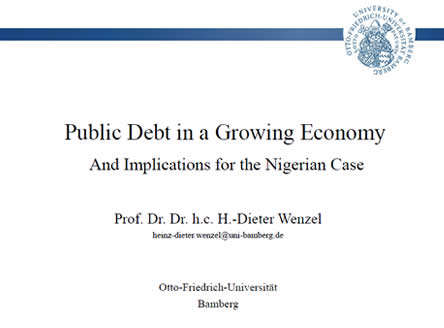Author:Prof. Dr. Dr. h.c. H.-Dieter Wenzel
Document Size:31pages
Main Source of Presentation
Wenzel, H.-Dieter (2001). Growth Equilibria with Public Debt. Society and Economy in Central and Eastern Europe. Journal of the Budapest University of Economic Sciences and Public Administration. Bd.(Vol.) 23/1-2 S. 70-88. Budapest .
Wenzel, H.-Dieter (2006). Public Finance (ffentliche Finanzen). Unpublished German Script from Bamberg University, Bamberg.

